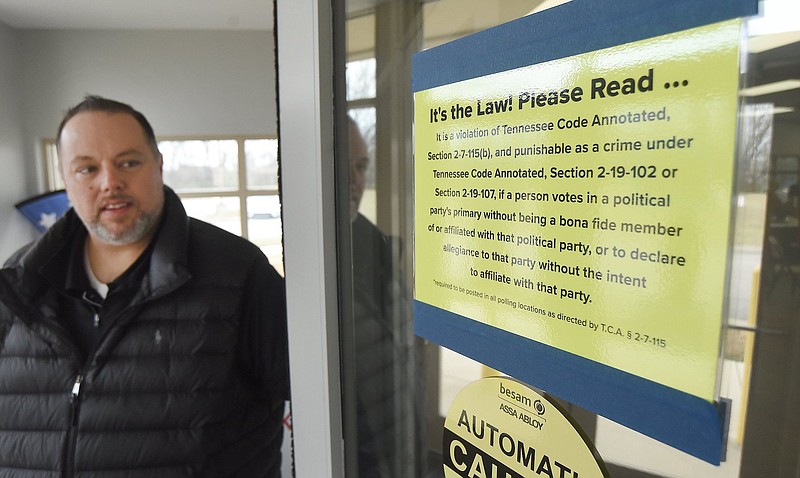Following a new law passed last year, polling places in Tennessee must post signs for the March 5 primary election warning voters it's illegal for them to vote if they're not a bona fide member of that political party.
The signs allude to decades-old law that has never been enforced, according to the League of Women Voters in Tennessee. The organization and two Knox County voters are suing the state, arguing it could deter voters from exercising a fundamental right.
One of the sponsors of that bill — state Rep. Tim Rudd, R-Murfreesboro — responded Monday to a series of emailed questions about the new law. The interview has been edited for brevity and grammar.
(READ MORE: Signs threaten voter punishment in Tennessee)
Q: My understanding is House Bill 0828 now requires polling places to have signage warning voters that voting in a party primary for which they're not a bona fide member could constitute a misdemeanor or felony under a 1972 state law. Is that correct?
A: The legislation requires a yellow warning sign no smaller than 8.5 by 11 inches warning it is against the law to knowingly cross over into another party's primary under current Tennessee Code. The penalty for this is both a misdemeanor and a felony depending on the actions taken. The law I passed does not change law or create a punishment. It only gives people the knowledge they could be breaking the law.
Q: What motivated you to craft the legislation?
A: The practice of crossing over into another party's primary has become blatantly and publicly organized with efforts made on Facebook, emails and even media ads. ... I think most people do not know these efforts could result in their arrest and prosecution. I felt it is our obligation to let them know.
Q: You also sponsored House Bill 1398, which would have required voters to declare a statewide political party affiliation before voting in a primary election. What motivated you to sponsor that bill, which failed in a House committee in 2019?
A: I felt then, and do today, that I and other people on both ends of the political divide have a right to express what political party we align ourselves with. Denying me that right is a suppression of my constitutional rights. Political parties are independent organizations not controlled by or affiliated with government, and members of these organizations have the right to control who can attend and participate in their process of selecting their party's nominee. It would be the same as members of the Rotary Club showing up and electing the officers of the Lion's Club against their will.
Q: What are your thoughts on crossover voting in primaries? Is this something the state should prevent?
A: Yes.
Q: Are there instances where independent voters (those who don't have an allegiance to a certain party) should be able to weigh in on primary races if they have preferences regarding certain candidates?
A: No. They can exercise their choice and vote in the general election.
(READ MORE: What to know and where to vote early in the Hamilton County primary election)
Q: The League of Women Voters of Tennessee has said the new law could create confusion and intimidation because voters in the state do not register for a specific party and there is no way to determine what "bona fide" means. What do you think of those concerns?
A: The "bona-fide" status is determined by each political party and only applies to the political party's process as defined by that organization. For the government to interfere with a private organization's rules and internal matters would be unconstitutional.
Contact David Floyd at dfloyd@timesfreepress.com or 423-757-6249.
